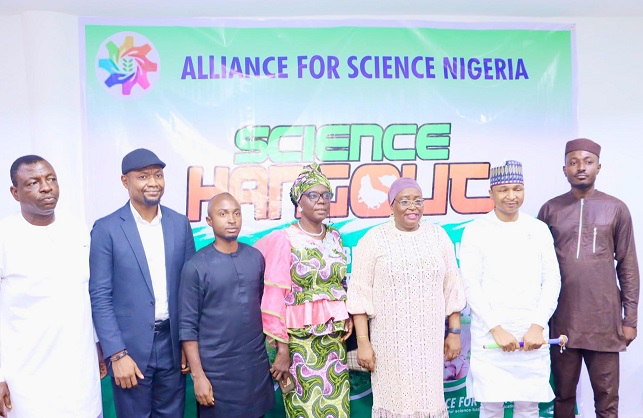Alliance for science seeks more sensitisation on biosafety management
Story from Aliyu NURA, Abuja
The Alliance for Science Nigeria has called for more sensitization of stakeholders including farmers on the roles of biosafety management in the general adoption of biotechnology in food production.
The Alliance reiterated the need for regulation of modern biotechnology in order to protect human health and the environment.
Alliance for Science Nigeria however acknowledged the activities of the National Biosafety Management Agency (NBMA) in regulating the release of Genetically Modified Organisms into the Nigerian environment.
Speaking during a recent Science Hangout the Coordinator of Alliance for Science Nigeria, Opuah Abeikwen said “Alliance for Science is a network of stakeholders who are passionate about agriculture, we try to promote access to scientific innovation in agriculture by engaging stakeholders, advocacy, training and communication.
“Science Hangout is a major platform where we engage stakeholders for meaningful discussions that are based on sound scientific principles about controversial topics such as Genetically Modified Organisms (GMOs), climate change and so on.
READ ALSO: China to support Bauchi on agriculture, infrastructure devt
“Modern biotechnology has proven to address some of the challenges facing agriculture, despite these potentials of biotechnology, it has to be regulated.
“The National Biosafety Management Agency (MBMA) has done well in approving certain GMOs which they do by involving other stakeholders, that is because safety is not a one-man business”.
Furthermore, the Alliance highlighted some of the challenges of global agriculture which has led to hunger, drought, climate change and malnutrition.
“Agricultural Biotechnology seems to have provided answers to some of these challenges. With simple techniques, crops are developed to resist pests, withstand drought and increase productivity. It is on this basis that the Federal Government established the National Biotechnology Development Agency (NABDA) in 2001 to lead the country on how to leverage this technology to solve some of the obstacles in the agricultural industry.
“Furthermore, to demonstrate the nation’s commitment to tackling the food crisis that is threatening its citizenry, the Federal Government in 2015 established the National Biosafety Management Agency (NBMA) as part of the legal requirement to superintend over the deployment and use of this technology in a manner that is in line with best global practice.
“Since their establishment, much has been achieved with regard to their various mandates. NBMA for example distinguished itself in 2017 when it approved the Pod Borer Resistant (PBR) cowpea – commonly referred to as beans. With this action, Nigeria became the first country to approve a food crop across the continent.
Furthermore, the statement said, “Nigeria is the highest consumer of beans across the world. Due to its inability to meet up with the demand for this staple, the country spends over N16 billion annually to import beans for 500,000 thousand people. Additionally, the farmers have to spray their products at least 10 times every planting season to fight Maruca vitratar, a deadly insect that causes the largest pre-harvest damages; reducing grains yield by up to 80% and lowering the quality.
“The PBR cowpea promises to address this setback in our food system and help Nigeria raise up to 48 billion per annum on its import bill. It would also ensure a massive reduction in the use of chemicals in food production and foster environmental sustainability.
“Despite the various breakthroughs that biotechnology has shown, there is still slow adoption by members of the public because of the limited knowledge of its benefits as aforementioned. The concept of biotechnology is extremely sophisticated and public enlightenment on its use, benefits, and contributions to enhancing food security is core to its successful adoption”.
In his remarks, the Director General of MBMA, Dr Rufus Ebegba charged the media to be neutral in reporting issues of biosafety and biotechnology.
He assured that MBMA will continue to be professional in its duty of regulating the application of biotechnology to safeguard the environment and human
“This is not politics; this is about humanity and leadership, which leadership sadly and unfortunately is missing in our country at this time,” he said.


